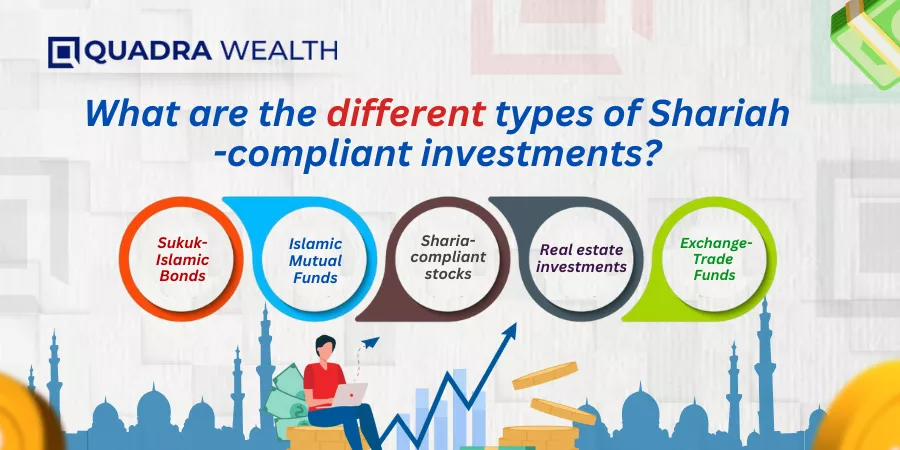Introduction
Shariah-compliant investments are those investments that comply with Islamic or Shariah laws of financing.
These investments do not work on the lure of profit or for the greed of money but predominantly as a mutual cooperation between the investor and the financial firm that offers these kinds of investment options.
Only if the investments follow Sharia-compliant compliance would the Islamic investors be able to participate and invest accordingly.
In this blog titled ‘What Are Shariah Compliant Investments’, we are going to touch down into the main line features of Shariah-based investment options and further provide you with investment options that can be Shariah compliant.
Get yourself started by reading this blog until its end:
What are the main features of Shariah-compliant investments?
These are the primary features of Shariah-compliant investments. Let us have a rundown into the same:
Meaning and Conceptualization
Shariah laws conform to Islamic guidelines of investors who invest and deal with financial instruments and investments. These are ethical and legal guidelines that help Muslim investors comply with investments and finances in a more streamlined fashion indeed.
These guidelines help Islamic investors streamline their operations with respect to their:
- Business practices
- Finances- dealing with different investment options
- Above all, it helps them handle their personal lives according to Islamic conventions
In a nutshell, the Sharia-compliant laws help investors tailor financial options that perfectly adhere to Islamic laws of financing and also ensure that activities or investments that prove harmful to Islamic conventions are completely avoided under the given parlance.
Prohibition of Interest or Riba
Shariah-compliant investments must be free from interest or what is known as Riba under the Islamic context. Charging interest or payment of interest to investors, as is the norm with most investment options, is considered Haramic or forbidden under Islamic Law. Therefore, when you deal with investments that pay you interest or coupons, these investment options are not Shariah-compliant.
Prohibits highly speculative elements (Meyser) in business
Shariah-compliant guidelines also deem or prohibit Islamic investors from dealing with highly speculative activities that engage with the following activities. These are:
- Companies that produce alcohol or alcohol-related products
- Industries that produce or manufacture cigarettes or other tobacco-related products
- Companies that deal with adult entertainment or porn activities
- Chains of hotels or restaurants that serve pork or delicacies that make use of pork
- Firms that deal with gambling activities or games
- Above all, firms that deal with the creation of weapons or lethal guns
Must comply with risk sharing on an equitable scale
You must now wonder what kind of investments are suitable for Shariah-compliant investment firms. We had briefed you about those sets of investments that must typically be avoided by Islamic investors on the whole.
The Islamic conventions or Shariah-compliant laws permit investments to have equal profit sharing between the concerned parties. This arrangement takes place via two types of structures and let us have a rundown into what these two are:
A- Mudurabah
This is a friendly investment option wherein you have partnership businesses done in an equitable manner. You have one partner that contributes to the capital for running the business while the other partner contributes to his expertise in running the overall management of the firm.
B- Musharakha
This is a joint venture option wherein both parties share capital and risks and manage the firm amicably. They jointly share profits and own assets of the business entity, and this arrangement can be Shariah-compliant too.
Prohibition of Gharar or uncertainty
This is the next primary feature that talks about how Shariah-compliant investments operate on the whole:
To comply with Shariah-compliant laws, you must deal with investment companies that hold tangible assets and sell tangible services to their consumers.
Dealing with trading activities that are highly speculative in nature leads to uncertainty or Gharar that is described as Haramic according to Islamic Law.
Therefore, you must avoid dealing with investment options that deal with uncertainty or risk activities or have speculative trading operations like equity markets do.
For instance, if a firm deals with sells real estate or sells oil sales, and you buy investments from these firms, then your investment is deemed as Shariah-compliant.
Whereas, when you deal with stock exchanges that buy and sell shares or equities, then this is an investment option prone to uncertainty and risk and therefore considered Haramic as per Shariah or Islamic laws of finanicng.
Ethical screening
To make investments Shariah-compliant, you can appoint Sharaih boards, and the advisory panel checks into each investment option to gauge if the investment is ethical according to Shariah guidelines or works against Islamic laws or principles. Only after the investment gets the approval of the Shariah boards can the investments be considered Shariah compliant ones.
What are the different types of Shariah-compliant investments?

There are specific types of investments that are specifically curated or designed for Islamic investors. Let us have a rundown of what these investment options are:
Sukuk- Islamic Bonds
Sukuk is an Islamic variation of an investment bond. Here, the investor does not get interest. He gets a profit share from the assets owned by the bond issuer.
Say, for instance, the rental income the bond issuer gets is transferred to the investor. The investments can also include availing returns through profit-sharing norms that benefit the product issuers and the investors on an equitable scale.
Islamic Mutual Funds
These are funds that are procured from multiple forms of Islamic-friendly investments. The funds are procured from Sukuk bonds, Shariah-compliant stocks, and other Islamic-friendly investments.
Via a diversified portfolio of Islamic-friendly stocks and bonds, you can pick your choice of instruments. For these companies, a Shariah advisory board is usually appointed to oversee the ethicality of these investments.
Sharia-compliant stocks
Sharia-compliant stocks belong to companies that deal with ethical financial practices that are deemed fit by Sharia-compliant laws. These stocks belong to companies that do not trade with gambling activities or indulge themselves into any kind of speculative activities whatsoever.
This means that these firms must not get a significant form of income from speculative activities like gambling, alcohol, or interest-based financial services.
Additionally, these firms must not get an unprecedented form of leverage, must maintain fair debt-insolvency ratios, and comply with ethical financial guidelines.
Real estate investments
Most of the real-estate dealings are straightforward as they deal with buying and selling of properties and properties are tangible assets. Therefore, real estate stocks or bonds are usually Sharia-compliant as long as the real estate companies do not divulge in fraudulent or unfair trade practices.
Islamic ETFs or Exchange-Trade Funds
These are funds that have Shariah-compliant indices and are permissible according to Islamic laws or conventions of investing. Islamic ETFs provide Islamic investors with diversified financial portfolios to deal with on a seamless platter indeed.
Shariah Compliant Investment screening
Islamic investment firms usually appoint Sharia-compliant boards for the following set of activities. These include:
- Undertaking a detailed review of how the company’s business activities are carried out
- Ensuring that the company’s investments do not deal with interest (riba), uncertainty (Gharar) and Risk (Meyser) into their investing options. Traditional investments or trading operatives usually are, therefore, not Sharia-compliant.
- Appointing well-experienced Shariah scholars who look into each of the above
What are the benefits of Sharia-compliant investments?

These are the benefits of Sharia-compliant investments. Let us have a rundown into the same:
Ethical Investments
Islamic conventions comply with equality and social justice and ensure fairness to all its investors. Therefore, Sharia-compliant investment options are highly ethical and benefit the investors and the companies that offer financial products to them.
Diversification
Shariah compliant assets comprise equitable risk sharing and do not mitigate interest earnings, exploitation of investors, and luring them with ultra-speculative business activities. The investors, therefore, get access to diversified financial portfolios that are free from risk or harm.
Growing Market
You have many Islamic nations that are advanced like Malaysia, Indonesia, Dubai, Qatar, Saudi Arabia, Kuwait, Doha, Iran, and Iraq that comprises of Muslim investors that can afford lavish investment portfolios.
Islamic investments also suit Muslim investors who reside in the West like the US, UK, Australia, and Canada. Therefore, Islamic investments are growing fast in the field of global finance.
What are the challenges with respect to Sharia-compliant investments?
These are the pertinent challenges that are pertinent to Sharia-compliant investments. Here is a rundown with respect to the same:
Limited Options
Although Shariah-compliant investments are growing rapidly in the world of global finance, the investments here are limited as compared to traditional investment opportunities that thrive on interest earnings and deal with a certain degree of market risks or uncertainties that are involved with respect to credit or liquidity concerns of product issuers.
Complexity that is involved
Shariah compliance boards find it challenging to segregate investments into Shariah-compliant ones as most of the traditional investment opportunities fall out of scope here.
The Key Take Aways
Shariah-compliant investments do not comply with interest-bearing (Riba), Uncertainty (Gharar), and Meyser (Speculation). However, Shariah-compliant investments are growing rapidly in world markets. What are your thoughts on this? Do let us know in the comments below!






